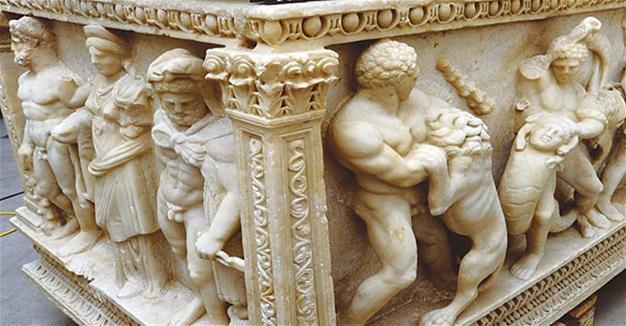Ancient smuggled sarcophagus coming home to Turkey
ANKARA
 An ancient sarcophagus smuggled out of Turkey in the 1960s could soon be on its way home following a decision from Swiss prosecutors.
An ancient sarcophagus smuggled out of Turkey in the 1960s could soon be on its way home following a decision from Swiss prosecutors. Speaking at a press conference in the capital Ankara, Tourism Minister Nabi Avcı said the final legal objections to the ancient artefact’s repatriation had been overcome.
The sarcophagus, which depicts the Twelve Labors of Hercules and was smuggled out of southern Turkey’s ancient Anatolian city of Perge in the 1960s, is expected to be back in the country shortly, state-run Anadolu Agency reported.
The item was confiscated by the Swiss authorities in 2010, and Geneva prosecutors decided on March 24 that it should be returned to Turkey.
Speaking at a news conference, Avcı said a comprehensive joint study had been carried out by legal experts in Switzerland and Turkey on the issue.
In 2010, Swiss customs authorities discovered the second-century Roman sarcophagus in Ali Aboutaam’s warehouse in Geneva, according to an Al-Jazeera report.
Aboutaam’s family had owned the sarcophagus for decades, but was unable to provide proof of origin at the time of its sale to the Gandur Foundation. Faced with doubts over the object’s ownership history, the sale was cancelled. The Swiss authorities then alerted Ankara, which decided to pursue a legal course of action.
“These procedures were launched to try to find out who had exported the object and where the illegal excavation had taken place. It was clearly the product of an illegal dig,” Marc-Andre Renold, the lawyer representing Turkey, told Al-Jazeera.
In September 2015, a Swiss justice finally ordered the repatriation of the sarcophagus to Turkey. But Aboutaam continues to claim ownership based on a certificate delivered by the Art Loss Register, an organization that keeps a database of stolen artworks.
For a fee, any buyer or seller can ask the London-based Art Loss Register to sift through more than 400,000 objects in its database to verify that a piece is not listed.
However, it has its limitations because objects discovered in war zones during illegal digs will never be listed.
“The Art Loss certificate only really covers classically looted objects. But in this case, the rightful owner, a state, doesn’t know that it’s the victim of a theft. It doesn’t know how or when the item was discovered or taken,” Renold told Al-Jazeera.
Avcı said many Turkish historical artifacts had been smuggled abroad since Ottoman times and were exhibited in some major museums despite being stolen.
He added that he hoped this case would set an example for other countries’ museums, many of which hold artifacts smuggled from Turkey.
















